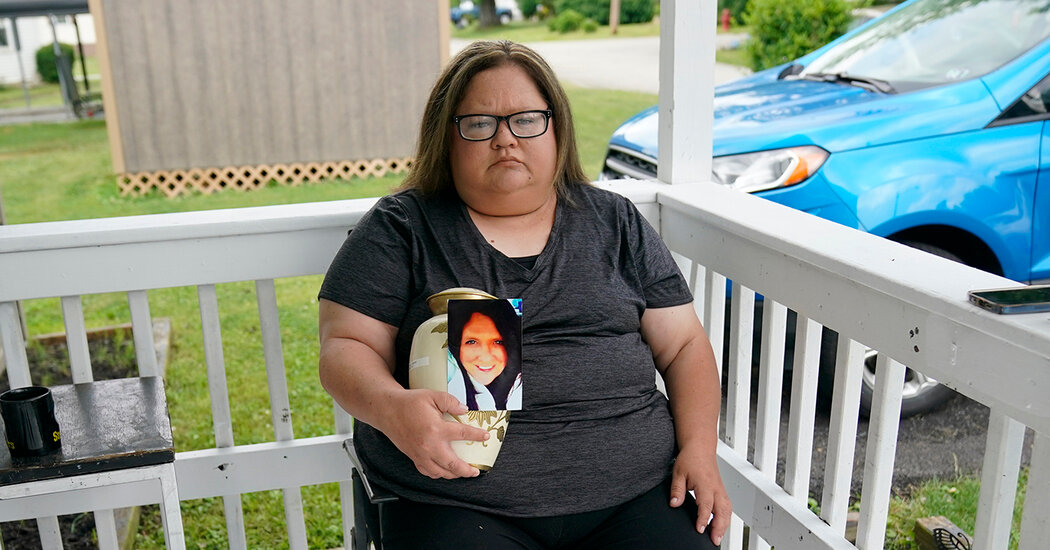
A 911 dispatcher has been charged with involuntary manslaughter after he failed to send an ambulance to a woman in rural Pennsylvania who was bleeding and incoherent and who died a day later, the authorities said.
The dispatcher, Leon Price, 50, of Waynesburg, had indicated on a 911 call with the woman’s daughter, Kelly D. Titchenell, that he would not send an ambulance to her mother, Diania L. Kronk, unless Ms. Kronk agreed to go the hospital, according to a criminal complaint.
But a 911 dispatcher does not have the legal authority to refuse to send medical services “on a condition of a medical refusal,” and there was no evidence that Ms. Kronk intended to refuse medical services, the complaint states.
Mr. Price was charged on June 26 with four misdemeanors: involuntary manslaughter, recklessly endangering another person, official oppression and obstructing the administration of law or other government function, according to the Greene County district attorney, David J. Russo.
“It is rare that 911 dispatchers get criminally charged, but it has been done in the past and, in this case, the evidence suggests the Kronk family was denied emergency services that led to the death of a family member,” Mr. Russo said in an interview.
It was not immediately clear if Mr. Price had a lawyer, and he could not be reached at phone numbers listed under his name. He has not yet entered a plea, Mr. Russo said.
Such accusations more often result in disciplinary action, said John H. Kelly, general counsel for the National Emergency Number Association, which represents the 911 industry.
“Criminal charges for what is effectively neglect of duty — and that is what the argument here is — are very, very rare,” Mr. Kelly said.
The maximum penalty for involuntary manslaughter in Pennsylvania is five years in prison and a $10,000 fine.
Ms. Titchenell called 911 in Greene County on July 1, 2020, pleading for help for Ms. Kronk, prosecutors said.
She told the dispatcher that her mother was “really bad,” hadn’t been out of bed in three days, had been drinking heavily, was “turning yellow,” had lost “so much weight” and was “making noises,” according to an audio recording of the 911 call released by Ms. Titchenell’s lawyer, Lawrence E. Bolind Jr.
The dispatcher asked Ms. Titchenell if her mother was willing to go the hospital. “She’s going, or she’s going to die,” Ms. Titchenell said. The dispatcher said, “We can’t force her to go in an ambulance.”
After he repeated that Ms. Kronk could not be forced to go to the hospital and had to be willing to go, Ms. Titchenell said, “She’s got to go because, if not, she’s going to die.” She added, “I don’t think she’s even in her right state of mind now.”
The dispatcher ended the call to Ms. Titchenell, who was driving to the home where her mother was staying, by asking her to call back once she got there to “make sure she’s willing to go before we send resources out there, in case she says no.” He added that as long as Ms. Kronk was willing to go, he would send an ambulance.
Mr. Bolind said that Ms. Titchenell did not call 911 again once she got to the home.
“Having the services refused by 911 defeated her mentally,” he said, adding: “You don’t have to call back. It should have been dispatched immediately.”
Ms. Titchenell said in an interview that she had no cell service at the house and that she found her mother outside and naked.
Ms. Kronk, 54, who was jaundiced and bleeding from a hole in her esophagus, died at the house the next day, July 2, 2020, without an ambulance ever being sent, Mr. Bolind said.
“It’s like, what’s the issue?” Ms. Titchenell said. “Is she not good enough to receive the same treatment as anyone else?”
The county detectives’ investigation revealed that 911 services “violated protocol and their own procedures” by refusing to dispatch an ambulance to Ms. Kronk, even though all three ambulances were available, Mr. Russo said.
He said the investigation was continuing and would examine whether “this was a result of a potential unwritten 911 management policy in Greene County.”
In general, dispatchers abide by the motto “When in doubt, send them out,” which encourages them to dispatch emergency medical workers, police officers or firefighters who can assess a situation in person, Mr. Kelly said.
“I don’t know whether or not the action or inaction of this particular dispatcher warrants” charges, Mr. Kelly said. “That’s really something a judge and a jury is going to have to figure out.”
In May, an emergency services dispatcher in Buffalo who was accused of hanging up on a 911 call from a supermarket employee during a shooting rampage was fired, an official said last month.
The firing came after a white gunman killed 10 Black people at Tops supermarket on May 14 in one of the worst racist mass shootings in the country in recent history.
Latisha Rogers, an assistant office manager at the supermarket, told The Buffalo News that she had called 911 while hiding inside the store and was whispering on the phone to avoid the gunman’s attention.
She said the dispatcher admonished her for speaking quietly.
In 2018, a former 911 operator in Houston was ordered to serve 18 months of probation after, prosecutors said, she “systematically hung up on” people calling to report emergencies ranging from robberies and homicides to speeding vehicles.
Ms. Titchenell said she was frustrated that charges were not filed against Mr. Price until she filed a federal lawsuit against him and the county last month.
“I hope everyone learns from this,” she said. “If someone needs help, just send help. Let E.M.S. decide if they need to go to the hospital. The dispatcher shouldn’t be making that decision.”




